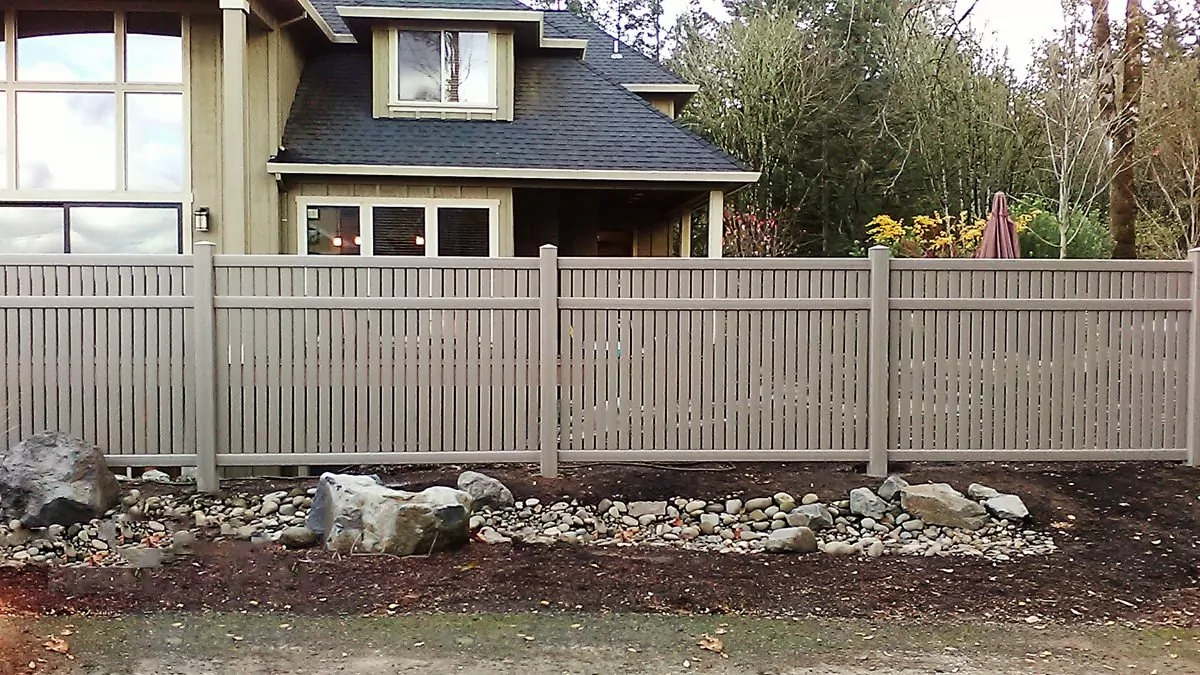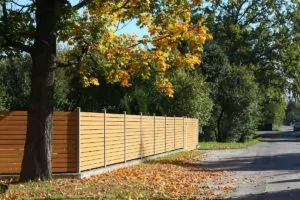Vinyl fencing is fast becoming one of the most popular materials to mark property lines, keep your pets in the yard, or just improve the resale value of the home. They’re nearly maintenance-free, quite durable, and come in a wide variety of designs and colors.
Unlike wooden fences that are painted, high-quality vinyl won’t chip, crack, or splinter and never need to be re-painted or stained. It’s an ideal product for the true four-season weather we get in the Pacific Northwest. The only real maintenance is using the garden hose or pressure washer to clean off any dirt or grime.
However, there may be times you’re thinking about changing things up around the home. If you’re thinking about painting your house, the new color may clash with the existing vinyl fence. Or maybe you just bought a house with a less than agreeable vinyl fence color. Maybe you are just tired of the existing color and want to change things up.
Can you paint a vinyl fence?
Simply speaking, anything can be painted with the right products. Epoxy-based acrylic paints are designed to adhere best to vinyl as latex or oil-based paints aren’t made to expand or contract. This will lead to chipping or cracks. Choose a primer designed specifically for vinyl that will retard the growth of mold and mildew or the best results.
The process of painting a vinyl fence is just like any other job. Make sure the surface is nice and clean before beginning. Vinyl can be scrubbed with soapy water but must be allowed to dry completely. You’ll want to use exterior paint of course.
If you’re planning on using a paint sprayer, make sure to follow all original manufacturer equipment instructions for the best results. You may need to thin the paint depending on the setting of your sprayer. Make sure every coat of paint is applied smoothly and evenly to reduce streaks.
Should you paint a vinyl fence?
For the most part, there’s no need to paint a vinyl fence because the colors are added directly to the material. But even if you want to change the color of your fence, think twice. Painting your vinyl fence isn’t a great option for a few reasons, including:
#1: Paint doesn’t adhere well to vinyl.
Vinyl is non-porous. That means most paint won’t adhere to it for the long haul. It might stay on for a short time, but over time, it will peel off and leave the fence looking worse than when you started. There are some paints that are designed to use on vinyl products, but they could still peel off and damage the surface of the fence.
#2: Painting causes more maintenance work for you.
Vinyl fences are some of the most low-maintenance fence products available. A lot of homeowners choose vinyl because of that: they don’t want to stay on top of staining or painting. Once you start painting it, it won’t be a low-maintenance product anymore and you’ll need to keep applying paint regularly to keep it looking vibrant and fresh.
#3: You could damage the surface.
Painting your fence could cause damage to the surface. This could void the warranty to the fence product, too. So, before you think about making any changes to the fence, check the manufacturer’s warranty or contract. There could be specific instructions NOT to paint your vinyl fence.
Other options to consider:
#1: Change the fence surroundings.
Plant some shrubbery along the fence line or a variety of flowers to block some of the views of the fence. You could also install some climbing vines that will grow up around the fence to add some natural beauty to it.
#2: Install a new fence.
Maybe you can’t stand the thought of looking at the vinyl fence any longer. Our experienced team of fence specialists at Pacific Fence & Wire can help with a replacement! We’ll go over some of the most popular fence options within your budget. Contact us today to get your fence replacement project started.
Have questions about your vinyl fencing? Contact Pacific Wire and Fencing today. We also provide classic wood fencing, aluminum fencing, decorative wrought fencing, and chain link or cyclone fencing. We offer a wide variety of designs of fencing as well as gates and other accessories for residential, commercial, and industrial applications.





